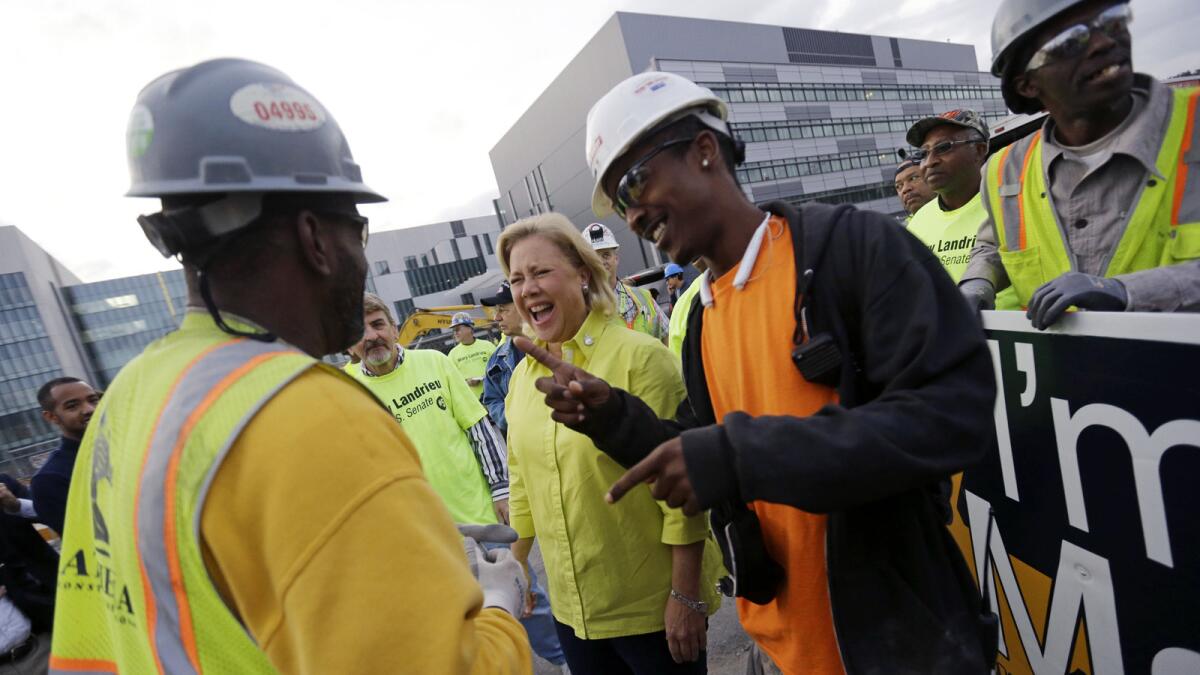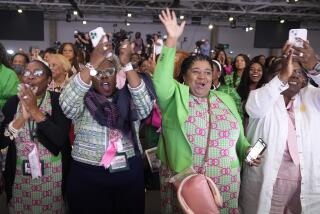Louisiana Senate race likely to hinge on black vote

- Share via
Reporting from New Orleans — Standing on a street of abandoned lots interrupted by the occasional dilapidated shotgun house, a campaign worker for Sen. Mary L. Landrieu looked down at the list of addresses where she was to knock on doors and assumed there had been a mistake.
The street, in a 9th Ward neighborhood still recovering from the devastation wrought by Hurricane Katrina, was practically deserted.
There had been no mistake.
The Democratic senator’s campaign left no stone unturned in New Orleans on Tuesday as it sought to get every possible African American in Louisiana to vote. Black voters were projected to support Landrieu almost exclusively in this race, and the three-term incumbent needed them more than she ever had before, as Democrats are rapidly losing support among whites in this state.
On Tuesday, signs of Landrieu’s desperate get-out-the-vote effort were evident in every corner of New Orleans, a city with a large concentration of African Americans. Campaign workers planted thick rows of lawn signs. They combed through barbershops and coffeehouses in search of potential voters. They zipped the candidate around town alongside a milk truck painted jet black that belted jazz fusion and funk tunes from giant speakers.
But at the polls, many black voters interviewed said it was not Landrieu’s persistent campaigning that drove them to vote as much as anger over the GOP attacks on the president this election season. Like many other Republican challengers nationwide seeking to unseat Democrats, Landrieu’s lead rival in the race, Rep. Bill Cassidy, has built his campaign around condemning the senator’s relationship with President Obama.
The attacks, which are energizing tea party voters throughout the country, are getting under the skin of voters like Minna Trusty.
“Obama has done a lot for this country,” said the 64-year-old nurse. “And people don’t want to accept it because of the color of his skin.”
It was a point made over and over by voters interviewed in predominantly black neighborhoods.
“It is a white-black thing,” said Jerry Jackson, 53, a hotel worker at the Ritz Carlton. “They won’t give him a chance to do what he can for America. Everyone knows that it is a race thing.”
Landrieu has been cautious in making that point on the campaign trail, not wanting to alienate the white voters who make up the bulk of Louisiana’s electorate. When the senator suggested in a television interview that Obama’s low approval rating in her state was attributable, in part, to Louisiana being a conservative place with a long history of racial bias, Republicans attacked.
And some voters who had supported Landrieu in the past found the remarks deeply divisive and unhelpful.
“I am appalled by her comments of the last few weeks,” said J. Hinnant, a 40-year-old engineer who describes herself as politically moderate. “I think she set the state back years.”
Hinnant, who lost her house in Katrina, walked into her polling place at a Catholic school in the Lakeview section of town disgusted by how the entire campaign was conducted on both sides, and still uncertain of how she would cast her ballot. The incessant political ads, she said, have hardly helped voters sort out what each candidate would do for the state.
“The amount of money that has been spent on those ads is revolting,” she said. As for the candidates, “I don’t like any of them.”
By dinner time, the lines at the Lakeview polling place were several voters deep. Some people walked into the polling place and then walked out because they did not have time to wait. The wave of voters in that part of town did not bode will for Landrieu; the ward is a rare GOP hotbed in New Orleans. Voters there opted for Mitt Romney over Obama in the last presidential election.
But earlier in the day, the polls were just as busy at the Martin Luther King Jr. elementary school in the largely African American 9th Ward.
Poll worker Esther Smith walked out of the school and took a deep drag on a cigarette.
“This is big,” Smith said. “They were all lined up before we even opened.”
Many of them, though, were not looking forward to the prospect of going through it all again in a month. But they will have to: with no candidate getting more than 50% of the vote, Landrieu and Cassidy move on to a December runoff.
Interest groups outside the state have already booked millions of dollars’ worth of television advertising in anticipation.
“I am so tired of all that stuff,” said Claudia Washington, a 50-year-old paralegal. “Politics has become so dirty. It is such a shame it has to be that way.”
More to Read
Get the L.A. Times Politics newsletter
Deeply reported insights into legislation, politics and policy from Sacramento, Washington and beyond. In your inbox twice per week.
You may occasionally receive promotional content from the Los Angeles Times.











